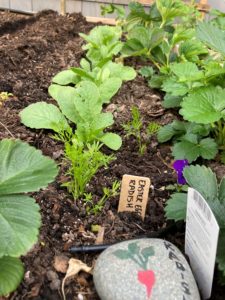Yesterday I attended an excellent online seminar, presented by CRFAIR (Capital Region Food and Agriculture Initiatives Roundtable) and the Food Literacy Working Group, on the heightened interest in growing food since COVID-19 and the consequent support of local organisations. The vulnerability of our food system has been underscored during the pandemic as panic-buyers emptied grocery store shelves, supply chains were disrupted, meat-packing plants shut down, and news of potential food shortages spread. The BC Eco Seed Co-op reported a 350-375% increase in sales, and other seed companies and garden centres have been similarly flooded with orders. As businesses closed, people got laid off, and sales plunged, the ensuing economic hardship has led to greater food insecurity. The Mustard Seed food bank has reported an 80% increase in demand for food boxes and meals.
In response to increased need, the Good Food Network launched Growing Together, a collaborative initiative to support people, particularly marginalised populations, in accessing the resources to grow their own food. Some of the projects are as follows:
Fill Your Basket: A grant program run by the ŚW̱,ȻENEṈITEL Indigenous Foods Initiative to support Indigenous families establish gardens. They emphasise the inclusion of native plants and have a list of plants selected that are specifically indicated for COVID-19 symptoms.
Get Growing Victoria: Victoria has converted the nursery in Beacon Hill Park to grow 75,000 vegetable and herb starts, which are set to be distributed next week to those disproportionately impacted by COVID-19, including immunocompromised and food insecure individuals.
My F.E.D. Farms: An effort by the Food Eco District to install food gardens for 500 families and laid-off workers.
Mentor Matching: A project where experienced gardeners are matched up with novice gardeners for a gardening mentorship.
Seedlings for Saanich Seniors: A program that provides free seedlings for over 200 seniors.
Pictured: Solscape NZ


